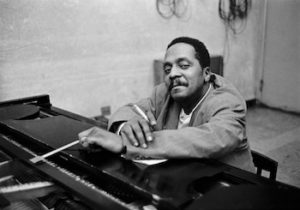
Bud Powell
Bud Powell, a Black jazz pianist and composer, was born on this date in 1924.
Earl Powell was born in New York City, the son and grandson of musicians. As a child, he began studying European classical forms and helped bring jazz piano into the modern age. Regarded as the originator of the modern jazz piano style, Powell was also active in developing the genre known as bebop.
An innovator with an uncannily fluid style, Powell’s technical facility and creativity overshadowed his inconsistency and the difficulties he faced in dealing with some fellow musicians. In one story, Powell was teased one night by his friend, pianist Art Tatum, for not using his left hand enough. The next evening, Powell played brilliantly while seated atop his right hand and using only his left. Tatum was in the audience and had nothing but praise.
Powell played in Cootie Williams' big band from 1943 to '44. Shortly after that, he became part of the bop scene, working with saxophonist Charlie Parker and various others and in smaller combos led by musicians such as Dizzy Gillespie. The pianist's friends included keyboardists Thelonious Monk, Elmo Hope, and Herbie Nichols.
Bud Powell’s life included many health problems. His first major hospitalization occurred in 1945, reportedly the result of a brutal beating suffered at the hands of members of the Philadelphia police force. Numerous hospitalizations, bouts of depression, electro-shock therapy, and using tranquilizers and alcohol marred the remainder of his life.
Powell began to suffer from emotional problems that kept him from working steadily. 1959, he moved to France but returned in 1964 to play at New York City's Birdland. Powell made a series of marvelous recordings for the Blue Note, Roost, and Verve labels. He spent 1959-'64 in Europe, was a resident in Paris, and then returned to the United States for a brief concert tour. He stayed in New York, disappeared in early 1965, and died on July 31, 1966, of tuberculosis, malnutrition, and alcoholism.
The titles of Powell's compositions, which remain jazz standards, reflect his problems, "Un Poco Loco," "Hallucinations," and "Glass Enclosure" are a few. Powell served as the basis for Dexter Gordon's character in the 1986 movie "Round Midnight," although elements of the lives of Lester Young and Gordon were also written into the character.
All That Jazz: The Illustrated Story of Jazz Music
General Editor: Ronald Atkins
Copyright 1996, Carlton Books Limited
ISBN 0-76519-953-X